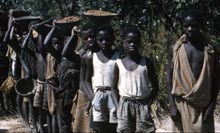“Outbreaks everywhere…”

Dear Deolinda,
The year was 1961.
That’s when you recorded in your diary on February 4: “Revolt in Luanda.” On March 15: “Another revolt in Northern Angola.” On April 19 your diary entry described a conference you attended in Chicago where African students at the University of Chicago offered to help the cause for Angola freedom. You said it was a wake-up call for them as news was beginning to circulate about the atrocities happening there and in many other parts of Africa.
 That was shortly after the letter I told you about written by Menina Sandy. She described the perilous situation in Luanda affecting missionary personnel and placing into question whether the work could continue, and whether it was safe for missionary wives and children to stay in the city.
That was shortly after the letter I told you about written by Menina Sandy. She described the perilous situation in Luanda affecting missionary personnel and placing into question whether the work could continue, and whether it was safe for missionary wives and children to stay in the city.
Part of the uproar by white Portuguese was the news of the vote by the U.S. representative to the United Nations urging that body to investigate conditions in Angola. After that, Protestants were blamed publicly in Angola newspapers for the rioting all over the country led by rebellious Africans.
Reports began to pour into the mission board offices in New York, one speculating that if the Portuguese dictator Antonio Salazar did not change his policies in Angola all Africans would be killed. His henchmen were starting at the top, killing African leaders first. At least half of the Methodist denomination’s 150 African pastors were either in prison, had fled with their people, or had been killed. In the Dembos area, most of the schools, pastors’ homes and villages were bombed. The dead had not been buried. Two pastor’s wives fled to Luanda pleading for help because their husbands and other family members had been killed. They described the horrendous scenes they had witnessed.
A press release from the communications department at the Board of Missions, attempting to give some perspective to the serious reports coming from Angola, painted a background of this overseas province, fourteen times the size of Portugal itself, where The Methodist Church began work in 1885.
The writer stated that the lot of the average African under Portuguese rule had not changed substantially in 100 years, something missionaries serving in Angola had always known. Periodically, they sent back reports to the board describing brutality and bloodshed and mass arrests victimizing vast numbers of the black population. They talked about back-breaking labor that children and women were forced to do, along with the literal slavery endured by village men, rounded up, beaten routinely to flog the maximum ounce of energy from their broken bodies to build roads and provide labor for unimaginably menial jobs.
For fear of reprisals on the African church, the missionaries and the board did not make this information public.
The press release stated that some of the outbreaks in Luanda and elsewhere in Angola in February 1961 and the wholesale massacre of Europeans in Northern Angola in mid-March were African responses to Portuguese rule. They began as raids by Africans on political prisons in Luanda and elsewhere.
The riots that you mentioned in your diary entry on March 15 began in northern Angola. Africans armed with bush knives attacked lonely Portuguese plantations, isolated commercial properties and government authorities living in rural areas. No one knows how many were killed. Women and children were not spared.
European civilians were issued arms by the government military so they could defend themselves and their families. They retaliated with a vengeance, resulting in the death of thousands of Africans.
As rumors of destruction, brutality and death spread, Africans fled to the tall grass and dense jungles. In Luanda, armed white civilians raided defenseless Africans, destroyed their homes, chapels and schools.
Streams of refugees began coming into Luanda. Terrible fear enveloped the city. Curfews were imposed. There were fears of a racial civil war of extermination.
The press release decried the massacres on both sides, in hindsight laying the blame on the Salazar government’s insensitivity to the needs of the Angolan people. It was this same government that for decades had reported to the outside world about the harmonious and integrated multi-racial society they had created.
As you know, Deolinda, from your own circle of friends and family, a large percentage of the Africans killed or imprisoned were trained by the mission to be nurses, teachers, clerks and pastors. They were the ones who might have quieted the hostilities fed by the people’s resentment toward the colonial powers that had occupied their land. Instead, so many of them were brutally murdered.
And as we all know by now, you soon answered your own call to arms.
